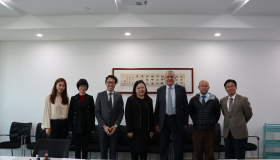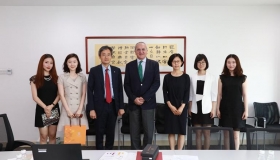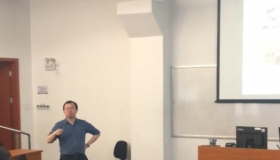CUHK (SZ) Receives First Shenzhen Fundamental Research
Recently, Shenzhen Science and Technology Innovation Committee announced the funding of fundamental researches and fundamental research deployment projects (7th batch) in 2015. A total of 29 projects will receive funding across the city. “Study on the design and fabrication of micro-Nano semiconductor lasers for optical communication”, the project that CUHK (SZ) submitted, was successfully selected to be the first funded Shenzhen Fundamental Research Deployment Project of the university.
The research team consists of 11 members, including Prof. Sui Kong Hark, Prof. Zhaoyu Zhang, two engineers, one postdoctoral student and six postgraduate students. The team has long been engaged in the study of Photonics. The leaders have participated in multiple research projects in Hong Kong and foreign countries and all possess strong technology research and development skills and laboratory management ability.
The project is dedicated to exploring the size limit of tiny laser cavity, and manufacturing the nano-scaled high-speed electronic injection semiconductor laser. This laser will greatly reduce both the area and cost of the current EOE (Electric - Light - Electric) interconnection scheme, which is expensive and bulky. Furthermore, this laser exhibits better transmission performance and higher signal integrity. The applications of this laser include integrated optical chips for short distance and high speed optical communication, and spectral imaging, etc.
Shenzhen Fundamental Research Deployment Project aims at obtaining intellectual properties and original innovation achievements. It mainly focuses on critical cutting-edge technical issues and its results are mostly papers, publications and patents. A variety of fields are involved in the project, including strategic emerging industries like Internet, biology, new energy sources, new materials, new generation of information technology, energy conservation and environmental protection; future oriented industries like oceanography, aerospace, biotechnology, robotics, wearable devices and smart devices; technologies concerning the improvement of people’s well-being like advanced manufacturing and resources.




